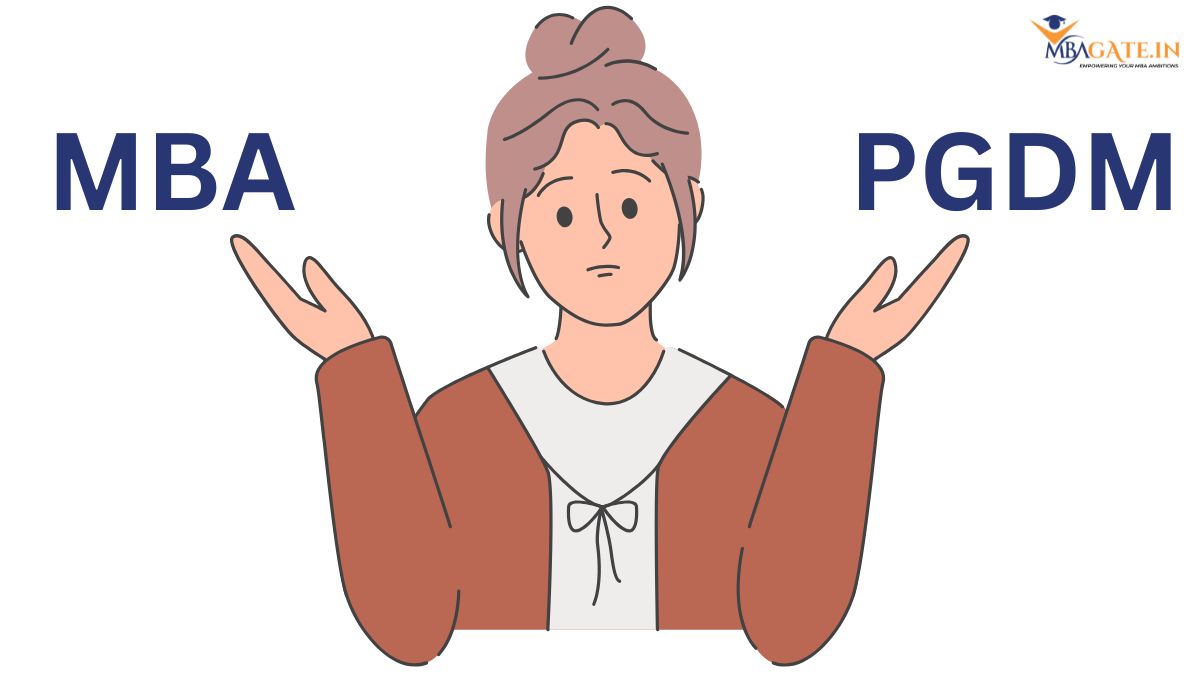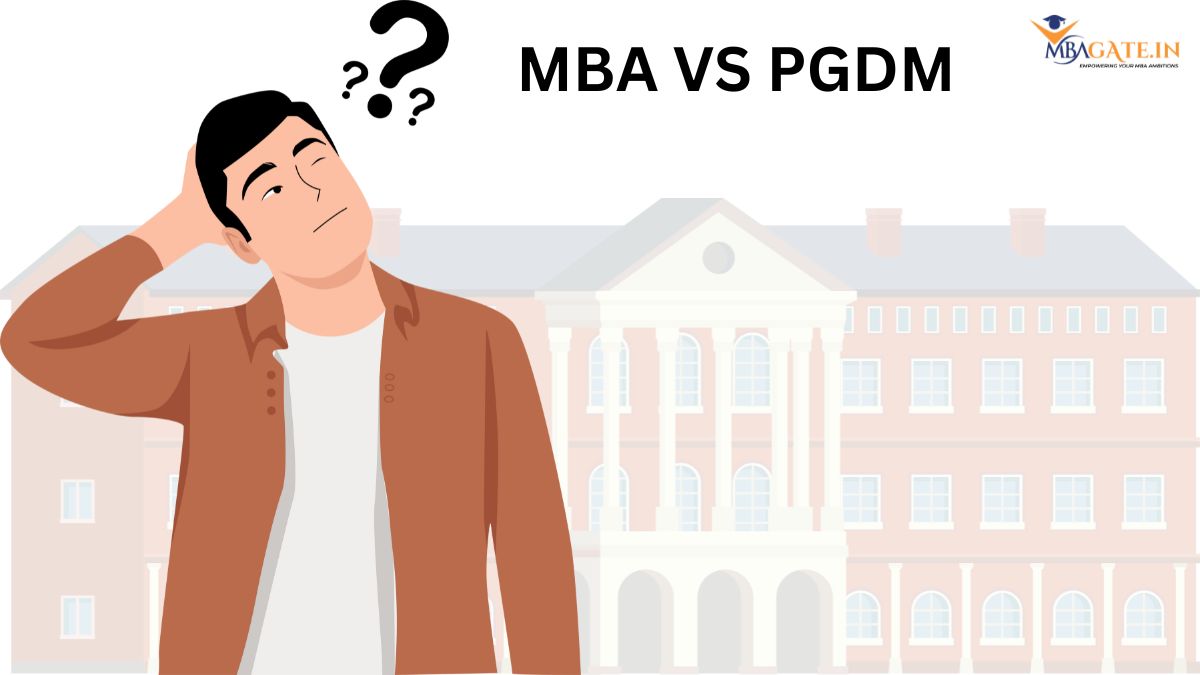MBA vs PGDM: Key Differences,Pros & Cons & Top Colleges in India
Table of Content
-
- + more items Show less
The important question that arises in the minds of aspirants is what is the difference between MBA and PGDM or which is better: MBA or PGDM? This comparison often confuses aspirants who aim to pursue a career in management. Both MBA and PGDM are highly respected programs whose main focus is on developing managerial and leadership skills but the structure, focus and scope of the programs are different.
An MBA is a postgraduate degree offered by universities or colleges affiliated with universities that are approved by UGC and focus on a balanced mix of theoretical and practical management education. On the other hand, PGDM is a diploma program offered by autonomous institutions approved by the All India Council for Technical Education (AICTE), emphasising industry-specific skills and a dynamic practical curriculum tailored to according current business trends.
The increasing relevance of these programs in the educational world is due to their capacity to prepare students for leadership roles in industries. With the fast-changing nature of the business world, organisations look for professionals who have robust analytical, leadership and decision-making abilities that this program seeks to provide. Both MBA and PGDM have become extremely popular because they provide rewarding career opportunities, help expand professional networks and move up the career ladder in fields like finance, marketing, operations and others.
Understanding the MBA-PGDM difference is important since the choice affects the aspirant's educational experience, career course and even global recognition. Whether they prefer the academic rigour and international recognition of an MBA or the practical industry-aligned approach of a PGDM this choice requires serious thought. The comparison will help the aspirants understand which program will best suit their goals, budget and preferred learning style.
What is a Master of Business Administration (MBA)?
A Master of Business Administration, popularly known as an MBA is a postgraduate-level degree program. MBA program helps in building the skills and knowledge required by the candidate in business and management. It helps in building a strong base for the candidates in areas like finance, marketing, human resources, operations and leadership. An MBA program has coursework, case studies, group projects and practicals that prepare students for a range of business management roles in various industries.
For those who want to move to leading roles or new fields or even start their venture, an MBA is the best choice for them. Depending on the schedule, the students can either pursue a full-time, part-time or Online/Distance MBA program. The value of an MBA degree in India is so much because it improves the career prospects of the candidate, increases their potential and provides different opportunities for networking and personal growth.
Those who have a minimum of 50% marks in their graduation in any field are eligible to apply for the MBA course. Some of the top colleges like the IIMs require higher scores and a CAT percentile of 80% or above. Other colleges can accept the scores of XAT, GMAT or CAT exams with graduation marks ranging between 50% and 55%. Also universities and their affiliated colleges provide MBA degrees as they are approved by the University Grants Commission (UGC).
The popular entrance exams through which candidates can take admission into the IIMs and the other top MBA institutes in India are such as CAT, XAT, GMAT, SNAP, NMAT, MAT etc. After the entrance exams the GD, WAT and PI rounds are conducted for the selection of the candidates. Some of the top MBA colleges in India include IIMs, XLRI, FMS, IITs and ISB with fees ranging from ₹2.00 Lakhs to ₹45.00 Lakhs. Popular specialisations of the MBA program in India include HR, marketing, finance, sales and operations.
What is Postgraduate Diploma In Management (PGDM)?
A two-year diploma course with the focus on practical management and business skills is referred to as a Post Graduate Diploma in Management or PGDM. A PGDM means that it provides students with industry knowledge in areas such as marketing, finance, operations, human resources and business analytics. The curriculum is designed to be flexible and updated regularly to match current industry trends ensuring students are job-ready upon graduation.
For those wishing to excel in corporate roles, get specialised expertise or explore entrepreneurial opportunities a PGDM is an excellent choice. The program includes case studies, group discussions, internships and live projects. This exposure gives students hands-on training in handling real world business challenges. PGDM courses come in different formats such as full-time, part-time and online/distance.
Candidates with at least 50% marks in graduation from any discipline are eligible to apply for PGDM programs. The top institutes like XLRI, ISB, SPJIMR etc require a higher percentile in entrance exams like CAT, XAT or GMAT besides good academic performance. Autonomous institutions accredited by the All India Council for Technical Education (AICTE) offer a significant number of PGDM courses.This status provides these institutions with the power to update their syllabi according to the industry needs.
Admissions to PGDM programs are usually through entrance exams like CAT, XAT, GMAT, SNAP, NMAT and MAT. After clearing the entrance exam candidates usually go through further selection rounds which include Group Discussions (GD), Personal Interviews (PI) and Written Ability Tests (WAT). Top PGDM colleges in India include the XLRI, SPJIMR, MDI and IMT with fees ranging from ₹144 Lakhs to ₹28.6 Lakhs.
Popular specialisations under PGDM courses include finance, marketing, operations, human resource management and business analytics. Students graduating with a PGDM qualification can easily find a job in reputed organisations at a good salary package particularly in private and multinational companies.

Difference Between PGDM and MBA
Given below is a detailed comparison between PGDM vs MBA covering multiple aspects:
MBA PGDM Full Form
MBA Full Form: Master of Business Administration
PGDM Full Form: Postgraduate Diploma in Management
Degree vs. Diploma (MBA vs PGDM/PGP)
MBA (Master of Business Administration): MBA is a postgraduate degree course recognised as a postgraduate degree by educational bodies such as the University offered by the universities or colleges affiliated with the universities. It is formally Grants Commission (UGC) and is generally accepted worldwide. As a degree program it frequently serves as a stepping stone to pursue further studies such as Ph.D. or to apply for government positions requiring a master's degree.
PGDM (Post Graduate Diploma in Management): A PGDM is a diploma course provided by autonomous institutions that are not associated with any universities. These programs are approved and regulated by the All India Council for Technical Education (AICTE) a central body ensuring quality education in technical and management fields. It is technically a diploma but it is highly respected in the industry, especially when obtained from prestigious institutes like XLRI, ISB and others.
Accreditation (MBA vs PGDM)
MBA (Master of Business Administration) and PGDM (Post Graduate Diploma in Management) are two major programs with very different regulatory bodies and curriculums.
MBA: The University Grants Commission (UGC) is the authority that governs higher education in India. This means that universities offering MBA degrees must follow a syllabus prescribed or approved by the UGC. This will ensure that the curriculum is standardised across institutions giving consistency and uniformity in what students learn. However this standardised approach sometimes makes the MBA syllabus less flexible in adapting to rapidly changing industry trends.
PGDM: PGDM programs are governed by AICTE whereas universities under UGC regulation do not enjoy this autonomy. Autonomous institutes that offer PGDM are allowed to design their own curriculums. This provides them with the flexibility to update the content of courses regularly so that the students learn the latest skills and concepts that are currently in demand by the industry. For instance newer developments in areas such as data analytics, artificial intelligence or new global business practices can easily be integrated into the PGDM course.
Curriculum (MBA vs PGDM)
The curriculum design and focus areas of an MBA (Master of Business Administration) and a PGDM (Post Graduate Diploma in Management) are two of the most significant differences between the two.
MBA Curriculum: The curriculum of an MBA program is more theoretical in nature as it focuses on building a strong foundation in core management concepts like finance, marketing, human resources and operations. It is more academic in nature and research-oriented making it a good option for students who wish to develop a deep understanding of management principles or further their studies like a PhD. MBA courses often include lectures, case studies and projects but the overall approach leans more towards understanding the concepts and theories behind business management rather than hands-on application.
PGDM Curriculum: A PGDM course is industry-aligned and designed according to the needs of the present business scenario. Its curriculum is more frequently updated with respect to current market trends to make the student competent in practising the skills sought by employers. It involves a mixture of real exposure like case studies, internships, live projects, workshops and skill building through leadership development and decision-making simulations.
Recognition: Understanding the Global and Local Value (MBA vs PGDM)
MBA Recognition: An MBA is a master's degree that is offered by universities or institutions affiliated with universities. It is a formally recognised degree throughout the world and is highly in demand for individuals who want to pursue an international career or higher education like a PhD. The standardisation and regulation of MBA programs under the University Grants Commission (UGC) in India ensure that the degree is recognised both by the educational and governmental bodies in India as well as abroad.
An MBA equips professionals with a competitive edge if they ever decide to work overseas or seek jobs abroad since many employers and academic institutions view it as on par with other master's degrees in management. This way the holder of an MBA has a greater chance of qualification in the global job market and academics.
PGDM Recognition: PGDM is a diploma program that is regulated by the All India Council for Technical Education (AICTE) and is highly respected by Indian recruiters, especially in the private sector. The focus of the program is on industry-specific skills and practical exposure making the PGDM graduate highly employable in the domestic market.
However, since PGDM is considered a diploma its acceptance differs from country to country. It may not be considered equivalent to a formal master's degree in some countries or institutions thus limiting higher education or jobs requiring a degree qualification. However many top PGDM programs offered by elite institutes like XLRI, SPJIMR etc command great respect across the globe considering the tough curriculum and reputation of the institutes offering them.
Entrance Exam (MBA vs PGDM)
Both the MBA and PGDM programs generally have their admissions based on entrance exams. An entrance exam helps assess the candidate's aptitude for management studies. While both have some overlaps in terms of exams they vary slightly based on the the type and significance of the exam.
MBA Entrance Exams: For the MBA programs offered by universities or affiliated colleges admission is done based on the scores of national-level exams, state-level exams or university-specific exams. Some of the widely accepted exams include: CAT, MAT, CMAT, MAH CET, SNAP etc.
PGDM Entrance Exams: The PGDM courses run by the autonomous institutes accept various entrance exams. These include the CAT, SNAP, NMAT, GMAT and XAT (Xavier Aptitude Test).PGDM focuses on national-level entrance exams such as CAT and XAT or even globally recognised tests like GMAT showing its focus on getting diverse and competitive talent pools.
The PGDM and MBA difference is given below in table format:
What is a Postgraduate Program In Management (PGP)?
A Postgraduate Program in Management popularly known as PGP is a program designed for those who wish to develop advanced business and leadership skills. It is a postgraduate-level program offered by autonomous institutes like the Indian Institutes of Management (IIMs) and other top business schools in India and abroad. Although PGP is similar to MBA it is often designed for professionals or recent graduates looking to excel in managerial roles across industries.
The PGP curriculum is focused on both theoretical foundations and practical applications which cover finance, marketing, operations, strategy and human resources. It is designed to use case studies, projects and experiential learning to provide real-world problem-solving skills. International exposure, workshops and industry interactions are also provided in some PGP programs to broaden perspectives.
A PGP program is usually 1 to 2 years in duration. Some are designed as full-time residential courses while others are structured for working professionals. Entry into these programs usually requires clearing competitive entrance exams like CAT, GMAT or institute-specific tests followed by group discussions, written ability tests and personal interviews.
Graduates of PGP programs take up high managerial and leadership positions in many of the leading companies with careers spanning various industries such as consulting, finance, marketing and technology. The program has great industry relevance making it the most sought-after option for those who want fast-track career progression or want to explore new fields.
Top MBA Colleges In India
India is home to some of the world's finest MBA colleges. They are known for their academic excellence, strong industry ties and great placements. Comparing the costs, duration and average salary packages that these programs offer will be crucial in deciding which MBA best suits your career goals. The list of colleges is given below -
Top PGDM Colleges in India
India houses some of the world's best MBA colleges. They are known to be great in academics, have good tie-ups with the industry and have good placements. Institutes like IIT Mumbai offer an excellent ROI. Comparing the costs, duration and average salary packages that these programs offer will be crucial in deciding which MBA best suits your career goals. The list of colleges is given below:
Pros and Cons of MBA vs PGDM
When deciding between an MBA (Master of Business Administration) and a PGDM (Post Graduate Diploma in Management) understanding their pros and cons is crucial for the candidate to make the right choice based on their career goals.

Pros and Cons of the MBA Program
Listed below are the pros and cons of the MBA program for the better understanding of the MBA hopefuls:
Pros and Cons of the PGDM Program
The pros and cons of the PGDM program are given below so that MBA aspirants can make an informed choice about which program they want to pursue:
Choosing between an MBA and a PGDM depends on one's career objectives, budget and the desire for academic brand value versus industrial exposure. The two routes have excellent opportunities when combined with the candidate's personal goals.
FAQs
PGDM programs are normally more practically oriented. It includes case studies, internships and project work. The MBA program is essentially a theoretical course that covers more general business principles.
Both degrees offer significant career prospects. However, for an MBA it is more likely that they offer broader management opportunities within different sectors and industries. The PGDM holder in contrast has practical training in quite a few sectors such as finance and consulting which are so desperately valued in their respective sectors.
An MBA degree is recognised globally, especially in multinational corporations. The international recognition may not be as great for the PGDM although it is recognised within India.
Both the MBA and PGDM programs take two years to complete. The semester system is more commonly followed in the case of MBA whereas PGDM follows the trimester system.
Both programs require bachelor's degree holders however there can be variation by institution. Overall PGDM may have flexible admission criteria as compared to an MBA program.
Yes, graduates from both MBA and PGDM programs can opt for higher studies like Ph.D. However only the graduates of MBA can opt for the doctoral management program.
Generally, the MBA courses offered by universities are cheaper as they are government-funded. However, PGDM courses offered by private institutions can be expensive.
MBAs are offered by universities and colleges affiliated with them whereas PGDMs are offered by independent business schools that may structure their curriculum and have AICTE approval.
The choice mostly depends on what kind of individuals these students represent in terms of their career aspirations. If it is an overall theory-based learning experience relevant for all business realms of activity then maybe an MBA would be perfect for them. But if a more specialised practical understanding with relevance is desired to selected sectors such as finance or Information technology for instance going for a PGDM would benefit the student instead.









